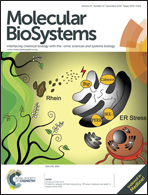Quercetin 3-O-rutinoside mediated inhibition of PBP2a: computational and experimental evidence to its anti-MRSA activity†
Abstract
The PBP2a is a cell wall synthesizing protein, which causes resistivity in methicillin resistant Staphylococcus aureus (MRSA) from β-lactam antibiotics but it is susceptible to 5th generation cephalosporin, ceftobiprole. Ceftobiprole inhibits the growth of MRSA by targeting the PBP2a-mediated cell wall synthesis, but it is reported to have adverse side effects. Due to this, there is a constant need to develop natural alternatives, which are generally free from adverse side effects. Hence in this study, in silico based docking analysis was performed with 37 quercetin derivatives towards PBP2a inhibition and their efficiencies were compared with β-lactam antibiotic, ceftobiprole. The docking studies suggested that quercetin 3-O-rutinoside (ZINC5280805) interacted efficiently with PBP2a, attaining the highest LibDock score (187.32) compared to other quercetin derivatives. The structural stability and dynamics of the identified lead with PBP2a were validated through molecular dynamics simulation. Simulation results such as RMSD, RMSF, and Rg values indicated that the stability of quercetin 3-O-rutinoside with PBP2a was better, with respect to the un-ligated PBP2a. Furthermore, the quercetin 3-O-rutinoside was subjected to an antibacterial susceptibility test and found to have antibacterial activity at 500, 700, and 900 μM concentration. Also, morphological changes in the bacterial colony and bacterial surface were observed using a scanning electron microscope, when MRSA was treated with 900 μM concentration of quercetin 3-O-rutinoside. Collectively, results from this study suggest that the quercetin 3-O-rutinoside has the capability to inhibit PBP2a and hence could be used as an alternative or in combination with other drugs in treating MRSA infection.


 Please wait while we load your content...
Please wait while we load your content...